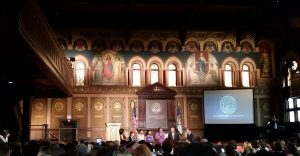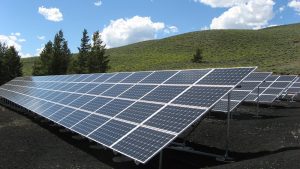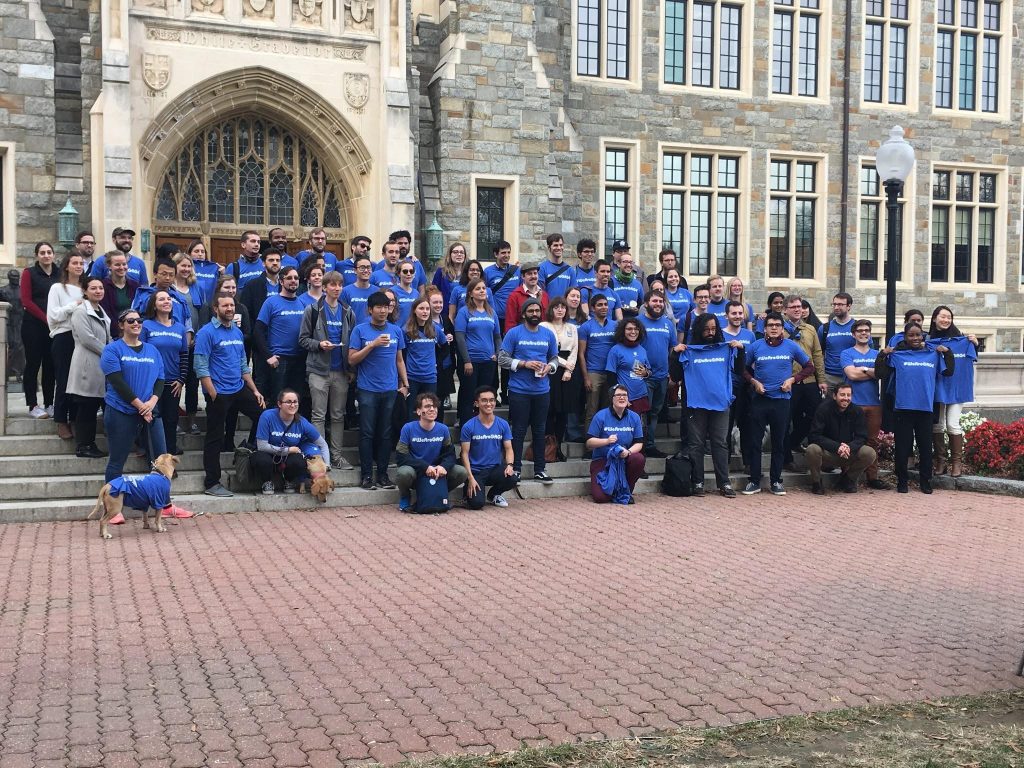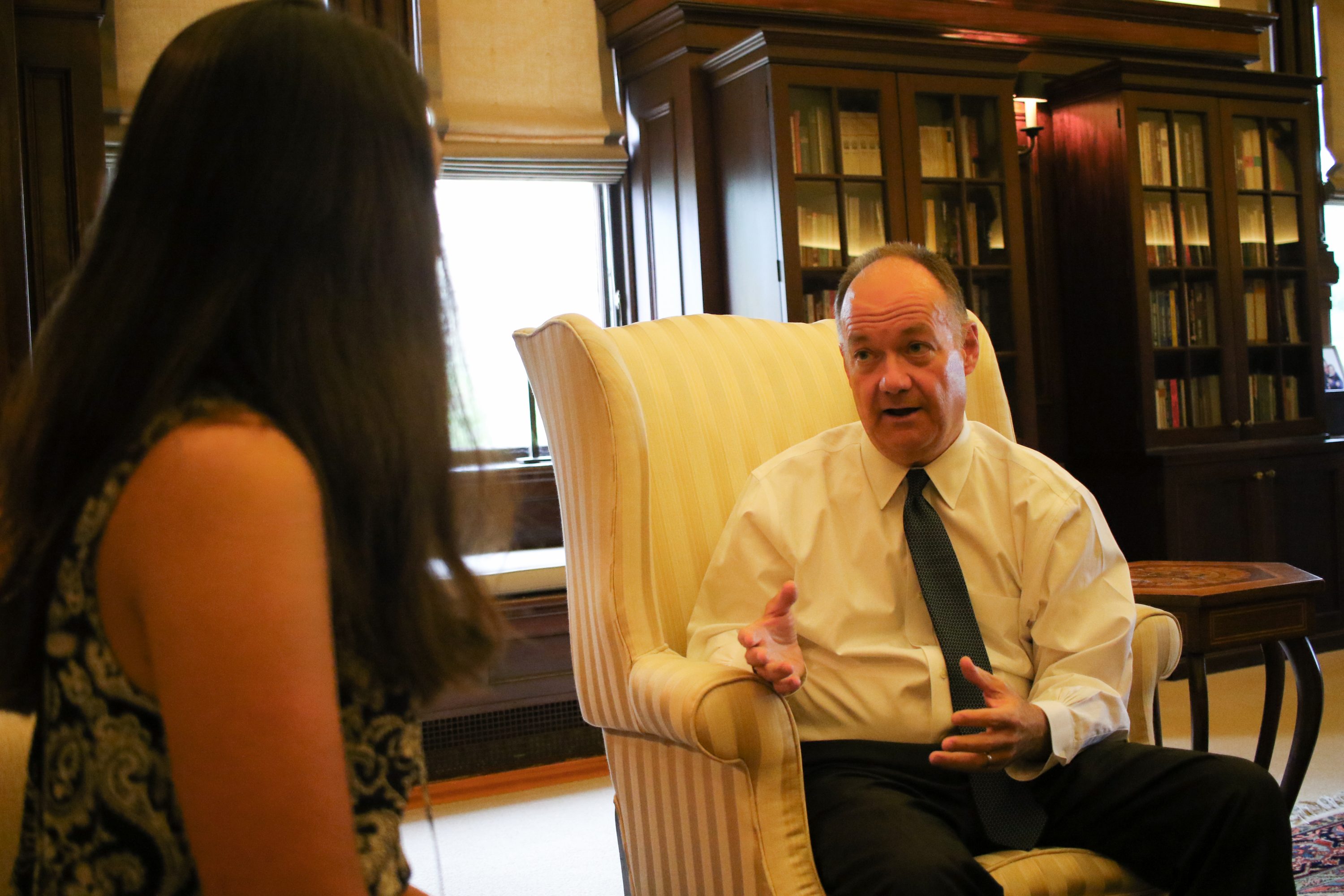Editor-in-chief of the Voice, Sienna Brancato (COL’20), sat down with Georgetown University President John DeGioia (COL’79) to talk about the biggest campus news on students’ minds as the academic year kicks off. This interview has been edited for length and clarity.
Sexual Assault on Campus
This summer, Georgetown hired Samantha Berner as Title IX coordinator and director of Title IX compliance. The conversation around campus sexual assault remains on students’ minds, particularly as the first few weeks of school are considered the “red-zone,” due to elevated rates of sexual assault. Read our coverage of Title IX and sexual assault–related issues on campus.
So I’m aware that the university utilizes a four-tiered education model on sexual assault and interpersonal violence for incoming freshmen. What new sexual assault prevention actions is the university taking specifically targeted at non-freshmen this coming year?
So all returning students would have had to go through the online piece that we’ve developed in partnership with Everfi. And we’re now three years into the mandatory bystander awareness, so we’re—by next year at this time we will be in a context where all four years of undergraduates should have had the bystander awareness. We also have a new commitment at the graduate level, and I think that’s a piece of it. The bystander piece has been pretty intense— it’s a five hour requirement, and we pretty much got everybody in the last two years. So the goal will be to accomplish that again this year and then add next year’s entering class, and then it should just continue. That’s been, I think, a really important additional piece to the puzzle.
We were able to bring closure to the search for the permanent director, so Samantha Berner is now in that role. Couldn’t be happier that she took on that role. We’re awaiting now the Department of Education’s response to all the comments that we provided. I was so proud of this community last year because we did 11 town halls and more than 300 people participated. I don’t know how many campuses had that level of engagement on it. We submitted our comments; we put all of that online for people to see, and we’re gonna find out just how seriously the Department of Ed[sic] is going to take our recommendations.
We had that task force a few years ago. It came up with a set of recommendations. We’ve been implementing those recommendations, and I think as a result of that this year, we will establish as a permanent part of our institutional structure a working group that will continue to sustain the commitment that we’ve put in place to implement the recommendations of the working group. Hopefully these will all make a contribution.
I know obviously everyone saw the Campus Climate Survey that came out in the spring. I know the results were expected to come out in the fall—
Yes, so we did that with the AAU+ schools, so it was fortunate to be able to be included in that. This will give us even more valuable data than the previous survey because that one we did ourselves. This one we’re doing together. Doing it together does take a little bit longer. We’re hopeful that we’ll be able to have access to that by October, and our intent will be to share that as soon as it’s appropriate to do so.
GU272 Referendum
Last semester, Georgetown students voted in favor of creating of a reconciliation fund to benefit descendants of people enslaved by Georgetown University. If accepted by the university’s board of directors, then a $27.20 fee would be collected from students every semester. Read our reporting here.
So moving to a different topic, following the presentation of the results of the GU272 referendum to the board of directors, what information can you provide us on the status of the implementation of this proposal? Second part, I also know that the university obviously has taken many different actions toward reconciliation including the formal liturgy, the renaming of buildings, and also dedicating specific resources to addressing health disparities within Washington, criminal justice reform, etc. What would you say to those who believe that the university still has a direct financial responsibility to descendants even given the other actions that have been taken?
So as I hope you know, we took very seriously the referendum of our students. For me to know that our students want to have the depth of engagement in the issue in an ongoing way is really important and very meaningful. I think it’s a great tribute to our student body that they show this depth of interest and engagement. We did a couple of things in the spring. We arranged for them to meet with a group of our board when the board came in for their next meeting which was in early June. We also had a full discussion at the board meeting itself, and the members who participated in that, who were in that conversation, were able to report on that conversation. And I think the spirit is a really powerful one and a positive one in the sense of the intent that our students bring to this.

DeGioia announced the Working Group’s report at an event on Sept. 1, 2016. Kevin Huggard//The Georgetown Voice
We also arranged for a meeting in the spring with some of our alumni leaders who would have an interest in engaging with our students on these issues, and that also went very well. And Dr. Ferrara, our chief of staff, who’s been coordinating a good deal of our work on slavery, memory, and reconciliation, has also met with them recently. And one of the good things was the referendum called for an implementation by the fall of 2020, which is great because it recognizes the sheer complexity of what we’re dealing with. And so the context is a complex one, and as I said we take it very seriously. There are a number of challenges to the idea of the implementation just on the basis of what was voted on. There are challenges just in principle with that. But as I said we take the intent so seriously. We’re trying to sort through how might we work our way through this.
We’re very proud of the work we’re doing in health disparities and criminal justice reform. We’ve got some other pieces of the puzzle that we’re going to be doing, but we would be doing that anyway. We think that’s just an important part of what it means to be a university. We launched the work of slavery, memory, and reconciliation about this time in 2015 and the working group completed its work and presented its report in September of 2016. In February 2016, on a sort of different track, I presented a talk on racial justice, a Georgetown response. And that launched a body of work that has resulted in our department of African American Studies, the recruitment of some faculty, the launch of this body of work on racial justice which we hope will now enable us to create a full institute focused on racial justice. And those pieces have their own kind of trajectory, and they relate, so it’s just kind of managing these pieces that really define this moment.We have a whole lot of other things we’re engaged in right now, including this ongoing dialogue with our descendants and with the Jesuits. And that has been a really powerful almost two years of work. It can’t really be rushed, but it is kind of the context in which all of our activities need to at least be respectful of. I don’t want to get ahead of the dialogue process with some of our other initiatives, even though some of our other initiatives—we can do some of it, but this one is kind of very closely related to what we’re talking about with the descendant community. That dialogue has been facilitated by the Kellogg Foundation, and they’ve done some exceptional work in the field of racial healing. And so they’ve been facilitating, we’ve been participating in a set of dialogues, Georgetown and the descendants, Jesuits and the descendants, Georgetown and Jesuits and the descendants. And we’ll be continuing that over the course of the next weeks, but that’s a prerequisite to being able to know exactly how best to—and it’s in that context, with the descendants, that we’re really engaging this question regarding what are our ongoing and future responsibilities.
Proposed Maryland Solar Project
In an attempt to create renewable energy sources for the university, Georgetown entered into a power purchase agreement with MD Solar 1, a subsidiary of Origis Energy, to secure access to an off-campus solar array and the energy it produced. However, the proposed location for the project would require the removal of 218 acres of forest to make room for the solar panels. This has caused a backlash from Georgetown students, and La Plata, Maryland residents for the potentially harmful ecological effects of removing valuable forests. The property is also valued by the native Piscataway people for their historical and spiritual connections to the region. Read our reporting here.
At the time of the interview, the project was still under review by the Maryland Department of the Environment (MDE). MD Solar had to apply for a nontidal wetlands and waterways permit for the project, as two streams pass through the property. Since the completion of this interview, the MDE chose not to grant MD Solar a nontidal wetlands and waterways because they felt the project did not “meet the statutory and regulatory criteria for issuance of a Wetlands and Waterways Permit.”
Per the pending MDE decision on the proposed solar project in Maryland, once the decision is released, if this project is approved, will you choose to proceed with the project? And how will you take into consideration the concerns of students, local activists, and the Piscataway tribe? And if no, then will you pursue alternative off-campus solar projects?
We’re open to the whole—we’ve reached no conclusions at this point. The starting point for us was a commitment I made in 2010 that we would try to reduce our carbon footprint by 50 percent by 2020. We’re actually on a pretty good track. Some of the ways to count those things have changed a little, so we had to double down on our efforts. But going solar for a good part of our power was an important piece of it, so when we entered into an agreement with the Origis power company, that they would deliver for us our energy through solar means. And then we—where they chose to build that solar farm is the context where we now find ourselves in a battle between Origis and some local advocates that we weren’t anticipating because we just were buying solar power. But we’re in it, so we’re engaging in it.

And we take the concerns that have been addressed very, very seriously. We’ve brought in our own third-party environmental assessment firm to take a look and give us a sense of the costs and benefits of what doing this solar farm will do and what it will enable us to do at what cost and can we justify and defend putting it there. We have arranged for the principals to meet with some of our student leaders. The firm is now going through the full regulatory review process. And I understand that Maryland has a very rigorous regulatory review. That will be relevant as we try to think through this. Was it done very very seriously? What does our environmental assessment tell us? We brought in a couple of our faculty who are leaders in the field of environmental sustainability.
I mean our intent here is to do good, so the idea that we’re in this—we’re balancing attention between competing goods really, and we’re gonna wait until we get through the whole process before we decide just where we think we should be. Our goal however remains to get to 50 percent reduction in our carbon footprint rather quickly, and we had hoped that this would be a way to do that. So we will see. More to come on that one.
GAGE Negotiations
Last November, the Georgetown Alliance of Graduate Employees (GAGE) voted in favor of unionizing, affiliating themselves with the American Federation of Teachers (AFT). As of April 2019, the GAGE’s bargaining committee was entering its third round of negotiations with the university. Read our reporting here.
What can you tell us about the status of the university’s contract negotiations with GAGE?

GAGE rallied for unionization in November, 2017. Photo: Noah Telerski
I think we negotiate in good faith. It’s our first one, so I think it’s not a surprise it would take a little bit longer. But from the beginning, once we were able to develop this structure for this conversation, I think on both sides it was very promising. This is a time where many of our peers are wrestling with a more contentious framework, but I think the opportunity to do this in the way that we have with AFT and with the American Arbitration Association and to design this in a way that we’re at the front end for both sides to be able to understand what mattered to both—when we mapped all that out at the very beginning of the process, trying to anticipate the end you could just see we’re not in fundamental disagreement about the things that matter to either of us. We recognize what matters to our students, and we don’t disagree with that. I think they appreciate what matters to us, I don’t think they disagree with that. So once we’re able to get clarity regarding each other’s needs and expectations, and we were able to construct a framework, I think both parties or all parties are negotiating in good faith, and I think we’re building trust toward that. So I hope it will be able to work out in the coming months.
Anti-Immigrant Sentiments and Building an Inclusive Community
With immigration at the forefront of political discourse, uncertainty exists with regard to the future of the Deferred Action for Childhood Arrivals program and the Development, Relief and Education for Alien Minors (DREAMERS) Act. Anti-immigration rhetoric persists, and President Trump has spoken negatively of immigrants coming to the U.S. from places he called “shithole countries.” Read our coverage of DACA and the Dreamers here.
So what would you say to Hoya families both in the U.S. and around the world in light of recent rhetoric regarding immigration, President Trump’s proposed broadening of the public charge rule, and particularly his comments telling four elected Congresswomen to “go back” to the countries they came from?
Yeah. I think you may know of the work that I’ve been a part of for quite some time now on our dreamers and on DACA. I’m one of the founding members of the steering committee of the presidential alliance on immigration, and we immediately came out with a statement, a very strong statement opposed to the public charge, and unequivocal. So the values of our institution couldn’t be more at odds with this current public rhetoric. The evidence of that I think would be the work we’ve been doing to support our own undocumented students. I have to believe we have a whole other group of—we’ll discover in the next days because usually when—it’s when they come to the university that they generally have to present themselves that way just so that they can get access to some of the benefits that—you’re not allowed in K-12 and public institutions to ask, and unless you need a driver’s license or a social security number you don’t really have a reason to. Here, to get access to—not Georgetown benefits—but to get access to some of the benefits, you sometimes have to present. So that’s how we discover at the college level that we have undocumented students.
We’ve had a full-time director for undocumented students, Arelis Palacios, and she continues to serve in that role and support our students. Yeah, I’ve been a pretty out there public advocate on behalf of DACA.
We’ve been at it a while, we’re gonna stay at it. We believe deeply in trying to protect our DACA students and get a permanent solution for DACA and then a pathway to citizenship for our dreamers. It’s been our passion. We’ve been working with Senator Dick Durbin, D-Ill., for almost 20 years now, and he’s been the greatest advocate in the Congress for our Dreamers. He’s a double alum, he’s brought many, many of our students up and told their stories on the floor of the Senate, and we’ll continue to work with him as we go forward in any way we can.
Featured Image Credit: John Picker







